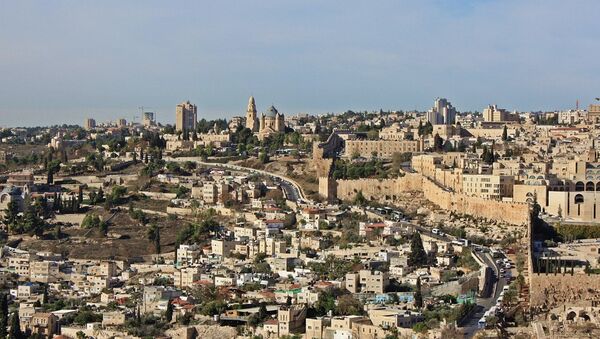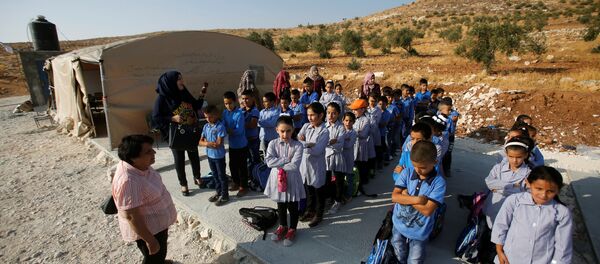Video from June 5 shows about a dozen men, presumably members of Israel's Nature and Parks Authority, at a work site in the Bab al-Rahma cemetery, through which Israel is planning to build a national park trail.
The cemetery sits adjacent to Al-Aqsa mosque, the third holiest site in Islam. It is believed to hold the graves of Ubada ibn as-Samit and Shadad ibn Aus, two of the Prophet Muhammad's companions. The cemetery has remained in use for more than 1,000 years.
Israel plans to seize about 40 percent of the cemetery for the national park under murky legal pretexts, Sputnik News recently reported. The plan has supposedly been in place since 2015, but Palestinian lawyers and conservation activists claim Israel is jumping the gun, as court cases over the fate of the cemetery remain pending.
Israeli authorities have recently resumed work on the park and have been seen digging up and marking graves, removing trees and fencing off areas to halt future burials. During the first weekend of June, several Palestinians were injured and arrested while protesting the desecration of the cemetery.
Outside of Jerusalem proper, in the West Bank, authorities are also clearing the way for a new settlement over the village of al-Khana Ahmar, a village mostly inhabited by Bedouin refugees who were expelled from southern Israel in 1952. In 2009, an Italian aid organization constructed a school there, but Israel ordered it to be demolished one month after it opened. After that, residents in neighboring Israeli settlements petitioned the courts to demolish the community, which has been slated for destruction since February 2010. In 2015, authorities confiscated solar panels that provided the only source of electricity to the village.
Israel plans to relocate them yet again, this time north to a village called An-Nuway'imah, allowing Jewish settlers to claim the strategically significant spot. Building an Israeli settlement there would allow the government to connect the urban Israeli settlement of Ma'ale Adumim to Jerusalem and to control the gateway between northern and southern parts of the West Bank.
Abu Khamiss, a spokesman for the current Khan al-Ahmar villagers, told France 24 in 2014 that "the place where Israel wants us to ‘relocate' would be like a prison for us. We'd be surrounded by Israeli settlements, a checkpoint and military training camps."
— Jahalin (@Jahalin) June 10, 2018
The demolition is expected to begin any day now. Already, Israeli authorities have been accused of poisoning locals' dogs under cover of night, robbing the villagers of the "faithful shepherds."
For Palestinian children living in the West Bank, getting to school is an incredibly difficult task because of their scarcity and the difficulty of traveling due to the abundance of Israeli checkpoints that control movement around the territory and can take hours to pass through. Israel is slated to destroy the Palestinian school in al-Khana Ahmar as well, a move the United Nations Relief and Works Agency for Palestine Refugees in the Near East said in 2011 "would effectively deny the children of the community their education and jeopardize their future."
According to a January report from the the UN Office for the Coordination of Humanitarian Affairs, at least 61 schools in the West Bank and East Jerusalem have pending demolition orders or stop work orders against them from the Israeli government.




